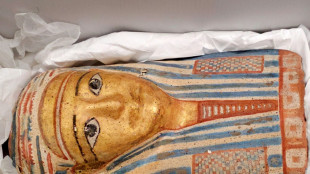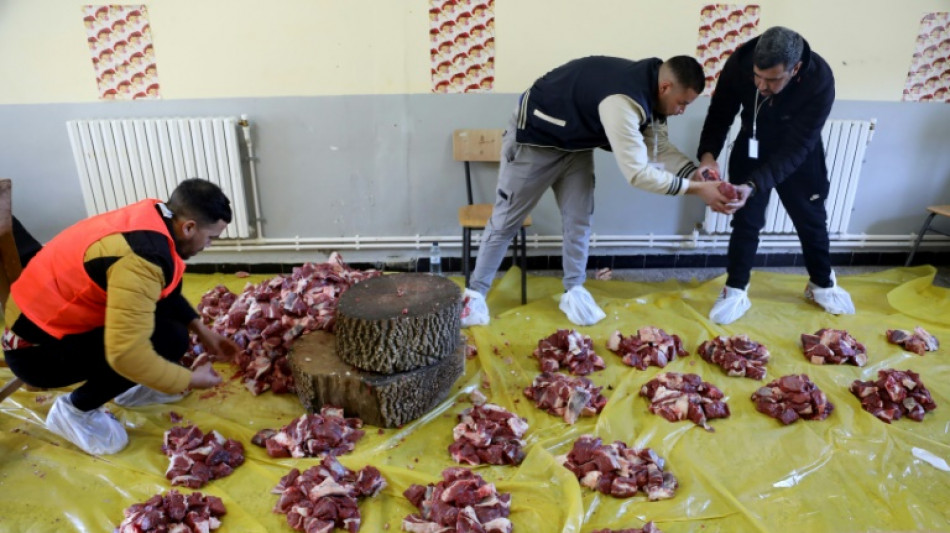
-
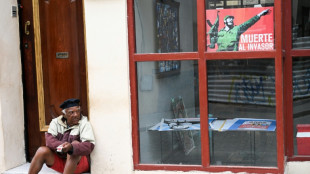 Doctors, tourism, tobacco: Cuba buckling under US pressure
Doctors, tourism, tobacco: Cuba buckling under US pressure
-
Indonesia capital faces 'filthy' trash crisis

-
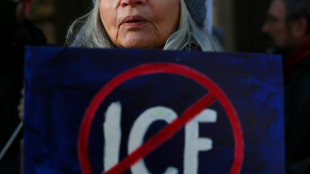 France grants safe haven to anti-Kremlin couple detained by ICE
France grants safe haven to anti-Kremlin couple detained by ICE
-
Frederick Wiseman, documentarian of America's institutions, dead at 96

-
 Gu pipped to Olympic gold again as Meillard extends Swiss ski dominance
Gu pipped to Olympic gold again as Meillard extends Swiss ski dominance
-
Copper powers profit surge at Australia's BHP

-
 China's Gu defiant after missing out on Olympic gold again
China's Gu defiant after missing out on Olympic gold again
-
Remains of Colombian priest-turned-guerrilla identified six decades later
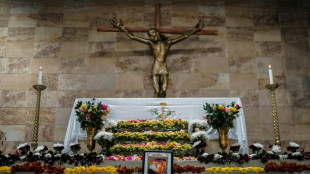
-
 USA bobsleigh veteran Meyers Taylor wins elusive gold
USA bobsleigh veteran Meyers Taylor wins elusive gold
-
Miura and Kihara snatch Olympic pairs gold for Japan

-
 Gu pipped to gold again as Meillard extends Swiss ski dominance at Olympics
Gu pipped to gold again as Meillard extends Swiss ski dominance at Olympics
-
Barca suffer title defence blow in Girona derby defeat

-
 Brentford edge out sixth-tier Macclesfield in FA Cup
Brentford edge out sixth-tier Macclesfield in FA Cup
-
Canada's Oldham wins Olympic freeski big air final, denying Gu gold

-
 France loosens rules on allowing farmers to shoot wolves
France loosens rules on allowing farmers to shoot wolves
-
USA thrash Sweden to reach Olympic women's ice hockey final

-
 Russian poisonings aim to kill -- and send a message
Russian poisonings aim to kill -- and send a message
-
France's Macron eyes fighter jet deal in India

-
 Arsenal to face third-tier Mansfield, Newcastle host Man City in FA Cup
Arsenal to face third-tier Mansfield, Newcastle host Man City in FA Cup
-
Robert Duvall: understated actor's actor, dead at 95

-
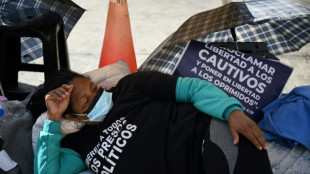 'How long?': Day Three of hunger strike for Venezuelan political prisoners' release
'How long?': Day Three of hunger strike for Venezuelan political prisoners' release
-
Berlinale: Film director Mundruczo left Hungary due to lack of funding

-
 Malinin talks of 'fighting invisible battles' after Olympic failure
Malinin talks of 'fighting invisible battles' after Olympic failure
-
'Godfather' and 'Apocalypse Now' actor Robert Duvall dead at 95

-
 Sinner serves up impressive Doha win on his return
Sinner serves up impressive Doha win on his return
-
Luis Enrique dismisses 'noise' around PSG before Monaco Champions League clash

-
 Grief-stricken McGrath left in shock at Olympic slalom failure
Grief-stricken McGrath left in shock at Olympic slalom failure
-
Brignone leads charge of veteran women as Italy celebrates record Olympic haul

-
 Sri Lanka's Nissanka leaves Australia on brink of T20 World Cup exit
Sri Lanka's Nissanka leaves Australia on brink of T20 World Cup exit
-
England match-winner Jacks proud, confident heading into Super Eights

-
 St Peter's Basilica gets terrace cafe, translated mass for 400th birthday
St Peter's Basilica gets terrace cafe, translated mass for 400th birthday
-
Meillard hails Swiss 'golden era' after slalom win caps Olympic domination

-
 Sri Lanka fight back after strong start by Australia's Marsh, Head
Sri Lanka fight back after strong start by Australia's Marsh, Head
-
Kovac calls on Dortmund to carry domestic 'momentum' into Champions League

-
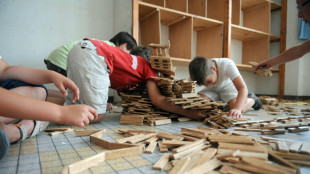 Dutch inventor of hit game 'Kapla' dead at 80: family
Dutch inventor of hit game 'Kapla' dead at 80: family
-
Benfica's Mourinho plays down Real Madrid return rumour before rematch

-
 St Peter's Basilica gets terrace cafe for 400th anniversary
St Peter's Basilica gets terrace cafe for 400th anniversary
-
Meillard extends Swiss Olympic strangehold while Gu aims for gold

-
 Meillard crowns Swiss men's Olympic domination with slalom gold
Meillard crowns Swiss men's Olympic domination with slalom gold
-
German carnival revellers take swipes at Putin, Trump, Epstein

-
 England survive Italy scare to reach T20 World Cup Super Eights
England survive Italy scare to reach T20 World Cup Super Eights
-
Gold rush grips South African township
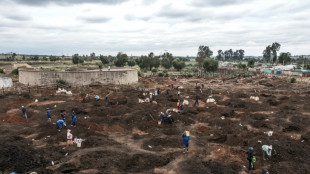
-
 'Tehran' TV series producer Dana Eden found dead in Athens
'Tehran' TV series producer Dana Eden found dead in Athens
-
Iran FM in Geneva for US talks, as Guards begin drills in Hormuz Strait

-
 AI chatbots to face UK safety rules after outcry over Grok
AI chatbots to face UK safety rules after outcry over Grok
-
Sakamoto fights fatigue, Japanese rivals and US skaters for Olympic women's gold

-
 'Your success is our success,' Rubio tells Orban ahead of Hungary polls
'Your success is our success,' Rubio tells Orban ahead of Hungary polls
-
Spain unveils public investment fund to tackle housing crisis

-
 African diaspora's plural identities on screen in Berlin
African diaspora's plural identities on screen in Berlin
-
Del Toro wins shortened UAE Tour first stage


Centuries-old Algerian indigenous tradition champions sharing
In a village nestled in the mountains of northeastern Algeria, locals and visitors gathered under a cold winter sky to celebrate Tamechrit, a centuries-old Berber tradition rooted in sharing.
Seeking to preserve a practice that faded during the Algerian civil war of the 1990s, villagers marked Tamechrit with Berber music and food on the occasion coinciding in January with the Amazigh new year.
The minority community of Berbers refer to themselves as the Amazigh, meaning "free people". They have long fought for recognition for their ancient culture and language in modern states across North Africa.
Berbers are descendants of pre-Arab North Africans, whose historic homelands stretched from the Canary Isles and Morocco to the deserts of western Egypt.
"We hope to perpetuate this tradition during cultural or religious festivals," bringing together different people from the village and even those who have left, Dahmane Barbacha, a 41-year-old from Ath Atig village, told AFP.
Children wore temporary Amazigh face tattoos at the event that dates back to the 13th century, according to historian Saleh Ahmed Baroudi.
Tamechrit means "offering" in Tamazight, the community's language recognised as an official language alongside Arabic in Algeria.
It represents "an occasion for gathering, fraternity, and reconciliation between families" across Amazigh villages, said Baroudi, who teaches contemporary Algerian history.
Different regions of the country use other names for the custom, he added.
The merrymaking is also held to observe major Islamic events such as the fasting month of Ramadan, Prophet Mohammed's birthday, and Ashura.
It is often held in Zawiyas, small places for worship and religious teaching, usually where a local saint or holy figure lived and was buried.
Baroudi said most of those sites are in mountainous regions, adding to the "spiritual dimension" of Tamechrit.
- Reconciliation -
The festival begins days in advance, when men from the village collect donations to purchase cattle whose meat is later distributed equally among families.
During the event a communal meal -- usually couscous prepared by village women -- is served to everyone, regardless of social standing.
Ammar Benkherouf, a 36-year-old living in France, said he has been taking annual leaves in recent years to attend the ceremony.
"I can't describe the happiness it brings me to help keep this heritage alive," he told AFP.
By midday, the communal couscous is served to villagers and visitors while volunteers distribute the portioned meat around the village's households.
Tamechrit had also been a tool for fostering solidarity during Algeria's Independence War against French colonial rule from 1954-1962, according to Baroudi.
The ritual then faded during the country's civil war between 1992 and 2002, a conflict between authorities and Islamist groups that claimed the lives of around 200,000 after the Islamic Salvation Front (FIS) party won municipal and legislative elections.
Tamechrit then "made a comeback in the early 2000s" with the end of the civil war, said Baroudi.
Today, Tamechrit continues to bring together villagers and resolve conflicts between them.
Farhat Medhous, a 31-year-old who heads a cultural association in Ath Atig, said his group now looks to "restore women's participation in these traditions inherited from their ancestors".
He said that, traditionally, women held their own gatherings in a separate area from the men's, but their involvement diminished even after the civil war.
In addition, he added, the association aims at teaching the younger generations Tamechrit values, meaning sharing and reconciliation.
He said this year's festivity was organised by villagers aged 18 to 40.
"We have held activities for children to teach them the values of volunteerism and community," said Medhous. "This prepares them to preserve these traditions as they grow older."
P.Martin--AMWN
